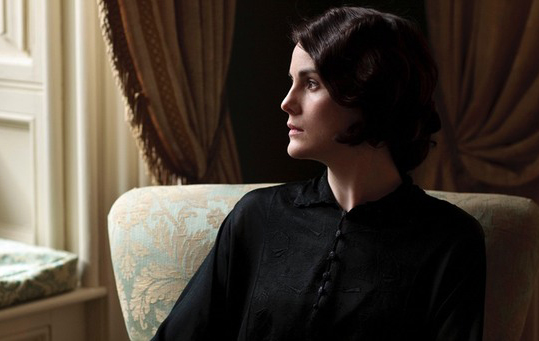Downton Abbey, Season 4, Episode 1
Directed by David Evans
Written by Julian Fellowes
Aired Sunday, 5th of January on PBS
The surprise death of Matthew Crawley that closed the book on Downton Abbey’s third season not only left a gaping hole in the show’s role call, but it threw the door wide open for future storylines. However, Downton’s residents have notoriously hesitated when it comes to the prospect of change, and the same might be said for the show’s creator, Julian Fellowes, who indicates in the season four opener that rather than use this tragedy as a jumping off point for bold new directions, he prefers to retrace the characters’ steps over extremely familiar territory. But redundancy aside, this episode also has refreshing moments of truly progressive thinking and genuine tenderness.
Matthew’s absence is at the core of nearly all the goings-on of the fourth season premiere. Downton Abbey’s presiding theme has always been the dissipation of the aristocracy by an insidious modernization of England’s class system. Matthew represented a soothing voice calling for the path of least resistance as the Crawley household crept into a new era. The silencing of that voice puts the lords and ladies of the Abbey at risk of regressing to old habits. Most at risk are Lady Mary and Lord Grantham. Robert, without Matthew’s influence, relapses to the patriarchal bullying that cost him his family’s support in the past. Mary remarks at one point that any “softness” Matthew detected in her seems to have dried up, and indeed her interactions (or lack thereof) with her infant child George back up her fears. Though not unexpected, there is a poetry in Mary’s struggle to pull herself out of grief to preserve Matthew’s reforms and his appeals for progress.
The danger of this regression in the character behavior also translates into a rehashing of overused plot devices. Several circumstances from the very first season are dredged up again in the most recent episode to air on PBS. Fellowes treats his viewers to yet another reminder of the incredibly sexist nature of inheritance law in bygone England, and technology does its duty again as the ominous harbinger of modernity and obsolescence demonstrated this time by Mrs. Patmore’s disastrous attempt to operate an electric mixer. And probably the most egregious violation of the “been there, done that” variety is the return of former maid Edna Braithwaite as Cora’s new lady’s maid, replacing a sorely missed Mrs. O’Brien. Edna may have picked up a few new skills, but it’s clear that she’s up to the same old tricks as soon as she gets her foot back in the door.
The refreshing part of this rehashing of old themes offers an opportunity to gauge the growth of so many beloved characters. Matthew’s legacy truly lives on in the progression of once stalwart attitudes. As devoted to traditional ideals as she may be, the Dowager has a soft spot for her granddaughters and proves in this episode that feminism isn’t entirely beyond her grasp when she turns her wit and acerbity into arguments in support of Mary’s right to a controlling interest in Downton’s management. Maggie Smith isn’t the only reason to watch Downton Abbey, but she might very well be the best one.
Another unexpected but not unwelcome benefit to the mournful tone of this premiere is the number of touching demonstrations of sentiment it elicits from characters better known for their stiff upper lip sensibilities, but it takes more than just family to raise Mary out of her despair. She draws just as much strength from the rallying of her devoted lady’s maid and her fatherly butler. The extent to which these loyal servants go to take care of the ruling class most likely exemplifies a nostalgic whitewashing of the mechanisms of an almost archaic class system, but highly fictionalized or not, it has its emotional rewards all the same.
All things considered, historical dramas like Downton Abbey deserve a certain amount latitude for its predictability. After all, most informed audiences know what becomes of the British aristocracy and their way of life. Their fates and failings hardly come as a surprise. So there is some plausibility in seeing the cast of Downton confront the same old problems over and over. Fortunately, it’s the changing attitudes and the gradual evolution of ideas that keeps the show fresh and appealing for a modern society.
Kenneth Broadway



